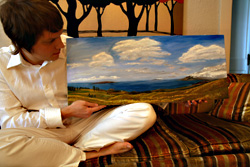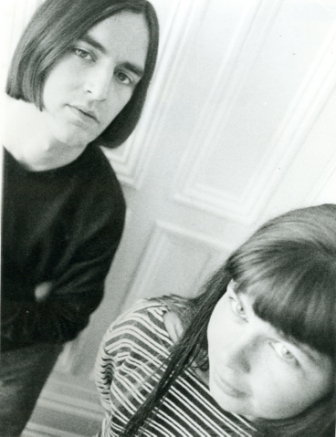According to legend, tourists who take home volcanic rocks and sand from Hawaiian shores are cursed with bad luck by Pele, the goddess of fire and volcanoes, until those items (which Pele sees as her “children”) are returned.
Jason Holstrom, a prominent fixture of Seattle favorites U.S.E. and Wonderful, didn’t bring home any sand or volcanic rocks from his first Hawaiian vacation, with his then-fiancée Angela in September 2003. But even he couldn’t avoid Pele’s wrath while soaking on the sunny eastern shores of Oahu, in the town of Kailua, where their car was burgled of cameras, bags, and credit cards—a vacation nightmare. “It’s always a bummer to get ripped off, but it didn’t put that much of a damper on the trip. It just sort of inspired me to think what I can do to give back,” says Holstrom. “I was really affected by the islands.”
Inspired by his experiences and tropical music, Holstrom, who had acquired a ukulele prior to the trip, sat down on the same shores where misfortune took place and began writing. The songs he wrote recently surfaced on his adventurous new island-pop record, under the villainous guise of the Thieves of Kailua. Back home, Holstrom self-recorded and took on almost every instrumental task (ukulele, guitar, drums, percussion) between tours with U.S.E., serenading love and lazing with an aw-shucks-well-that’s-OK attitude.
On a perfectly sunny Seattle summer day, at Tangletown restaurant Luau, Holstrom sat down with Seattle Weekly to discuss the evolution of the record, and Van Dyke Parks’ great influence.
Seattle Weekly: So you started writing when you were still in Hawaii?
Jason Holstrom: Yeah, there were a couple songs. The experience with the setting was really powerful and was clearly a big blast of inspiration. Coming home, I had these songs, but I didn’t think they were going to be for a record. Then I came up with the title, The Thieves of Kailua, and thought, “Wait a second, this could be a record!” and started writing songs that way and just sort of kept piecing it together with new stuff. I was really inspired by that Van Dyke Parks record Discover America.
When you were writing your songs in Seattle, was it difficult putting yourself in the tropical mind-set?
That was the thing—working on it in Seattle. It’s not always the sunniest place. But it can be oddly tropical here on a summer day like today. I was living in Madrona on this hill with this beautiful view, and I could just play guitar. I didn’t have much trouble getting in the vibe. I remember a couple times just walking down to Lake Washington, sitting on the beach, recording sounds and writing lyrics. I kind of tried to put myself in a dreamy, beach setting.
Was there anything, instrumentally, that you were trying to get away from?
The stuff I’ve been producing and playing in my bands, and stuff I’ve been mixing, there’s a lot of synths and drum machines, and using all those electronic sounds. So I kind of wanted to lash back against that a little bit. I said, “I’m not going to use any synthesizers or drum machine on the record.” So it’s almost all acoustic instruments—nylon-string guitar, steel-string guitar, ukulele, and drums.
Was it nice doing something separate from everybody else?
I don’t really look at it that way. Collaboration is great, but a lot of times, there is more you can get out. What’s great is being able to do my own thing and go off on a weird tangent.
Your record is awesome because it doesn’t seem like anyone playing pop music is really tapping island vibes. I’m curious to hear that Van Dyke Parks record, since it was such an inspiration for you.
It’s really weird. It’s just kind of random; there’s some steel-band tracks, and really lazy, groovy calypso. But he’s awesome! I actually met him. It was about a half-hour before U.S.E. was about to go on at SXSW. I had a CD-R version of Thieves of Kailua on me, and then he just walked out of a bar with his wife.
Did you give him the disc? Did you get any feedback?
Yeah, I kind of bugged him a little, and finally he was like, “All right, here’s the address. Send it here.” I made like 100 or so that were in these burlap sacks that we sewed together—they were really rustic. I sent him one of those, and then he wrote back and thanked me.
So it all came around for you.
Totally. I was like, “Discover America changed my life,” and he’s like, “Well, it didn’t change mine. I only sold a thousand copies.” But I recommend it.






